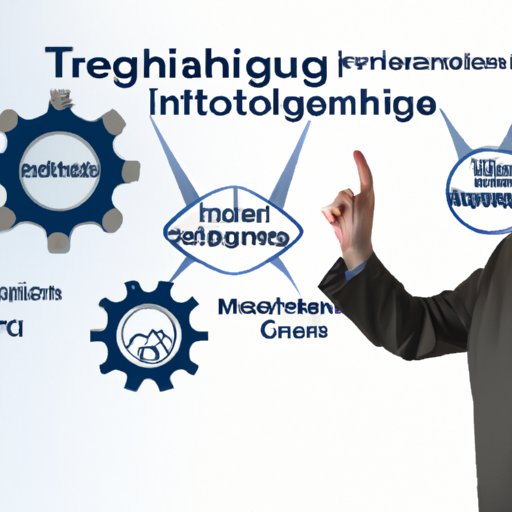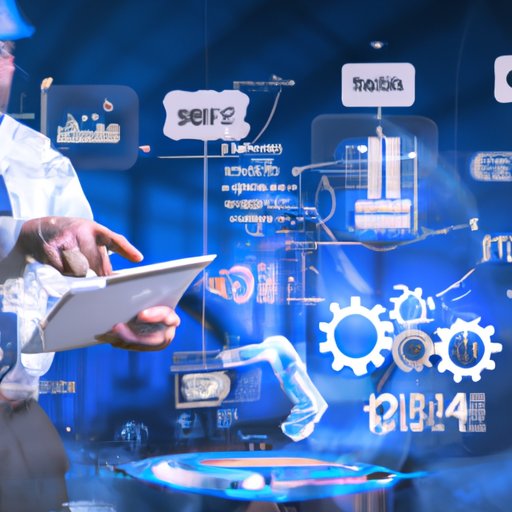Introduction
Industrial technology is a rapidly evolving field that encompasses a wide range of technologies that are used to automate processes, increase efficiency, and improve safety in industrial settings. It is used in many industries, from manufacturing to healthcare, and can be used to improve product quality, reduce costs, and increase productivity. In this article, we will explore what industrial technology is, its benefits, types, history, challenges, and impact on society. We will also discuss the current trends and future outlook for industrial technology.
Overview of Industrial Technology
Industrial technology is the application of technology to optimize production processes, increase efficiency, and reduce costs. It includes the use of advanced machinery, automation, robotics, computer-aided design (CAD), machine learning, artificial intelligence, and the Internet of Things (IoT). Industrial technology is used to improve product quality, reduce labor costs, and increase productivity. It is also used to improve safety, reduce waste, and enhance customer service.
Benefits of Industrial Technology
The use of industrial technology has numerous benefits. According to a study by the International Federation of Robotics, “Robots have helped to increase productivity and flexibility, reduce costs, and improve working conditions in factories.” Additionally, the study found that “the use of robots has allowed companies to reduce lead times and improve quality.” Industrial technology also helps to reduce labor costs, as fewer workers are needed when machines are used to perform tasks. In addition, it can help to reduce waste and improve safety in the workplace.
Types of Industrial Technology
Industrial technology encompasses a variety of different technologies, including automation and robotics, computer-aided design (CAD), machine learning and artificial intelligence, and the Internet of Things (IoT). Automation and robotics are used to automate processes and reduce labor costs. CAD is used to design and create products more quickly and accurately. Machine learning and artificial intelligence are used to analyze data and make decisions. And the Internet of Things (IoT) is used to connect devices and sensors to each other and the internet, allowing for remote monitoring and control.
History of Industrial Technology
Industrial technology has been around for centuries, but it has evolved significantly over time. Early machines were used to automate simple tasks such as spinning thread or weaving cloth. The Industrial Revolution, which began in the late 18th century, saw the introduction of steam-powered machines that could be used to mass-produce goods. This led to increased efficiency and productivity, as well as a reduction in labor costs. In the 20th century, computers and automation became increasingly common, leading to even greater efficiency and productivity gains.
Today, industrial technology is advancing at an unprecedented rate. Advances in artificial intelligence, machine learning, and the Internet of Things (IoT) are enabling companies to automate complex processes, reduce costs, and improve product quality. This is leading to greater efficiency and productivity gains, as well as improved safety and customer service.

Challenges in Implementing Industrial Technology
While industrial technology can provide numerous benefits, there are also challenges associated with its implementation. One of the main challenges is cost and accessibility. Industrial technology can be expensive and difficult to access, especially for small businesses. Additionally, training and education are needed to ensure that workers are able to use the technology effectively. Finally, there are security concerns associated with the use of industrial technology, as it can be vulnerable to cyber-attacks.
Impact of Industrial Technology on Society
Industrial technology has had a profound impact on society. On a macro level, it has had an economic impact, as it has enabled companies to become more efficient and productive, leading to increased profits and job creation. On a micro level, it has had an environmental impact, as automation has reduced energy consumption and improved resource management. Finally, it has had a social impact, as it has enabled people to work remotely and access services more easily.

Future Trends in Industrial Technology
The future of industrial technology is bright. Autonomous systems, such as robots and self-driving cars, are becoming increasingly common. Augmented reality is being used to improve safety and accuracy in manufacturing. And cloud computing is making it easier for companies to store and manage data. These technologies will continue to evolve, leading to greater efficiency and productivity gains.
Conclusion
Industrial technology is a rapidly evolving field that encompasses a variety of technologies used to automate processes, increase efficiency, and reduce costs. It has a long history and has had a profound impact on society, both economically and socially. Its use is increasing, and the future looks bright, with advances in autonomous systems, augmented reality, and cloud computing. As industrial technology continues to evolve, it will bring about even greater efficiency and productivity gains.
(Note: Is this article not meeting your expectations? Do you have knowledge or insights to share? Unlock new opportunities and expand your reach by joining our authors team. Click Registration to join us and share your expertise with our readers.)
